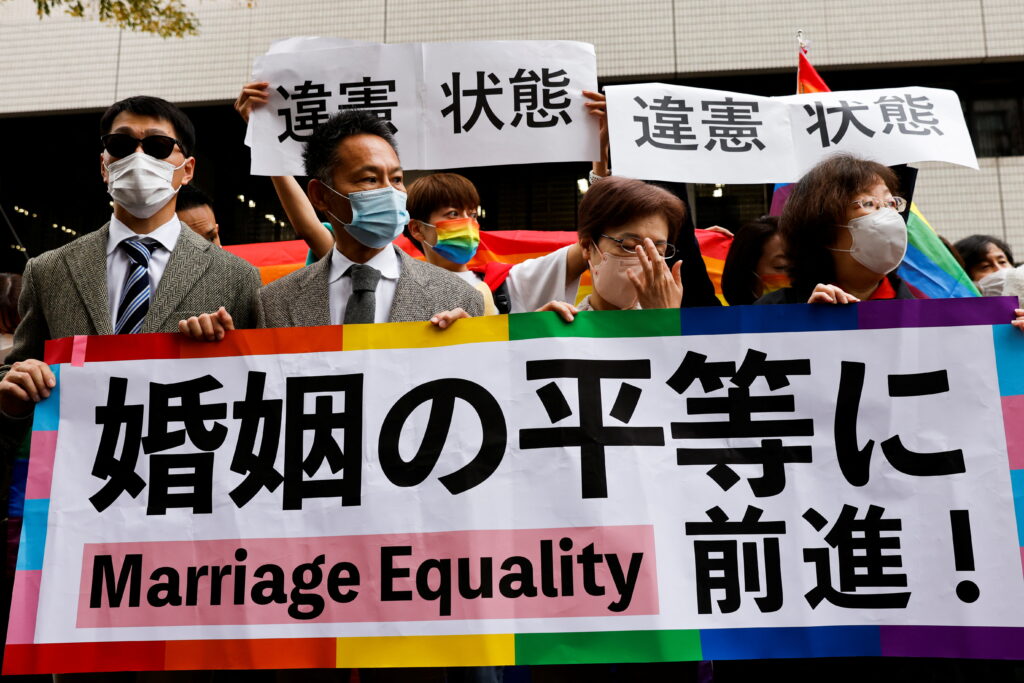Japanese society is arguably becoming more accepting of sexual minorities. In a nationwide survey conducted in February 2023, 72 per cent of respondents expressed support for legal recognition of same-sex marriage — a significant increase from 2015, when support was comparatively lower at 41 per cent. The 2023 survey places Japan’s tolerance rate above both the United Kingdom (at 73 per cent) and the United States (at 63 per cent), where same-sex marriage has already been legalised.
Despite this positive trend in public opinion, conservative lawmakers have continued to block petitions for marriage equality, leaving little recourse for same-sex couples seeking legal recognition and protection of their relationships. The Canadian Immigration and Refugee Board granted refugee status to two Japanese women in September 2023, concluding that the couple’s concerns about persecution in Japan were well founded due to their lack of access to benefits available to heterosexual married couples.
But there have been judgments made in Japanese courts that are gradually recognising the rights of sexual minorities. The Supreme Court’s March 2024 ruling on crime victim compensation indicated that same-sex couples in a de facto relationship should also be defined as eligible recipients of benefits.
The government may now be pressured to consider whether similar interpretations are possible for other systems where many couples are still disadvantaged due to their sexuality. But even if this trend of extending benefits to same-sex couples prevails, their relationship status cannot move beyond a ‘de facto marriage’, barring them from access to various benefits enjoyed by legally married couples.
So why hasn’t Japan legalized same-sex marriage yet? Considering that neighbouring Taiwan, which shares a similar patriarchal culture and trajectory of socioeconomic development, recognised same-sex marriage in 2019, there would seem to be no reason why it can’t be achieved in Japan. No unique institutional challenges exist either — while the country maintains a family registration system, recognising same-sex marriage would not obstruct the way it functions.
Still, Article 24 of Japan’s Constitution stipulates that marriage is formed ‘solely based on the mutual consent of both sexes’ — interpreted to refer to men and women. Within the Civil Code and the Family Register Act, ‘husband and wife’ refers to a man and a woman and marriage applications from same-sex couples cannot be accepted.
To amend Article 24 of the Constitution, an exceptionally high threshold must be met, requiring approval by two-thirds of the members of the National Diet and a majority vote in a national referendum. But marriage equality could also be made possible through a less onerous process of amending the Civil Code.
A group of opposition parties jointly submitted a bill to recognise same-sex marriage to the Diet in 2019 and the Constitutional Democratic Party, the largest non-government party, submitted a bill in its own right to the House of Representatives to amend the Civil Code to legalise same-sex marriage in 2023. Neither of these efforts have successfully led to legalisation.
This failure risks disguising the fact that most major political parties, including Komeito, the junior coalition partner of the ruling Liberal Democratic Party (LDP), are in favour of legalising same-sex marriage. The primary obstacle is a strong opposition force within the LDP itself, particularly given the connections between conservative LDP members and the religious right, especially the Family Federation for World Peace and Unification (formerly the Unification Church).
A recent ruling by the Sapporo High Court in 2024 drew the ire of conservative forces within the Seiwakai, the largest faction of the LDP which late-prime minister Shinzo Abe led. The case, brought by three same-sex couples in Hokkaido, marked the first time that an appeals court in Japan found the lack of legal recognition for same-sex partnerships to be unconstitutional.
Prime Minister Fumio Kishida has not wavered from his cautious stance on the issue of same-sex marriage, largely showing deference to the conservative forces within the LDP that oppose LGBT policies. Public trust in Kishida is at an all-time low. Following the LDP’s May 2024 fundraising scandal, five out of its six factions have announced the dissolution of their support organisations. But this will have limited influence on the legislative process for protecting the rights of LGBT individuals and eliminating discrimination.
The LDP factions are mainly focused on the distribution of positions and money, as well as garnering electoral support. In fact, LDP lawmakers are under popular pressure to extend more benefits to sexual minorities, but the material interests of sexual minorities are not yet the primary determinants of policymaking. Equally important, addressing discrimination against LGBT people cannot be resolved through the allocation of money alone. Morality politics suggests that moral issues, such as same-sex marriage, require a distinctive type of policy formation through a redistribution of societal and religious values.
Regardless of the ebb and flow of party factions, such morality politics will continue to persist in one form or another. At present, there is an increasing likelihood of a new group being formed by conservative LDP lawmakers aiming to restore ‘traditional Japanese values’, including opposition to same-sex marriage. If the LDP retains its parliamentary majority in the next election, legalising same-sex marriage will continue to pose a challenge for Japan.
Yasuo Takao is Adjunct Senior Research Fellow at the School of Media, Creative Arts and Social Inquiry at Curtin University.


In Japan, there has been a significant increase in public support for same-sex marriage and most major political parties are in favour of marriage equality. But attempts by the opposition to advance same-sex marriage legislation continue to be obstructed by conservative factions within the ruling Liberal Democratic Party (LDP). Though there are optimistic signs of progress in the courts, the LDP’s focus on garnering electoral support through rhetoric about traditional Japanese values remains a consistent challenge.